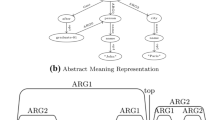Abstract
Linguistic parameters alone cannot determine the interpretation of natural language utterances. They can only constrain their interpretation and must leave the rest to other knowledge sources and other processes: language understanding is not just a matter of knowing the language, but also to a considerable degree a matter of logical inference and world knowledge. This is no news as far as the interpretation of referential expressions is concerned. Predicate expressions, however, tend to be treated as if they were functional or relational constants that are directly interpreted with respect to a model. In this paper an attempt is made to treat them too as referential. The only real difference is that the referents of predicate expressions are of a different type: concepts rather than first-order objects.
This generalized notion of reference gives us not only a natural way of understanding the interaction of knowledge representation and knowledge processing on the one hand and linguistic processing on the other, but also opens up a perspective for the modularization of Natural Language Understanding (NLU) systems (hat provides for a very high degree of independence of the more strictly linguistic component from the specific tasks and domains of a particular application. The overall result should be a less language-dependent knowledge representation and less domain-dependent linguistic components, i.e., overall improved portability of the modules.
Preview
Unable to display preview. Download preview PDF.
Similar content being viewed by others
References
Bierwisch, M. (1982): Semantische und konzeptuelle Repräsentation lexikalischer Einheiten. In: R. RuŽička and W. Motsch (eds.): Untersuchungen zur Semantik. Akademie-Verlag, Berlin, pp. 61–99
Bosch, P. (1979): Vagueness, ambiguity, and all the rest. In: M. van der Velde, W. Vandeweghe (eds.): Sprachstruktur. (= Akten des 13. Linguistischen Kolloquiums, Gent 1978). Niemeyer, Tübingen, pp. 9–19
Bosch, P. (1983): Agreement and Anaphora. Academic Press. London, New York
Bosch, P. (1985): Lexical meaning contextualized. In: G. Hoppenbrouwers, A. Weijters, P. Seuren (eds.): Meaning and the Lexicon. Foris, Dordrecht, pp. 251–258
Bosch, P. (1990): Indexicality and representation. In: R. Studer (ed.): Natural Language and Logic. Springer-Verlag, Berlin, Heidelberg, New York. pp. 50–61
Bosch, P. and Geurts, B. (1990): Processing definite NPs. Rivista di Linguistica 2:177–199
Brachman, R.J. (1990): The future of knowledge representation. In: Proceeding of the AAAI 1990. MIT Press, Cambridge, MA. pp. 1082–1092
Catlin, J.-C. and Catlin, J. (1973): Intentionality: a source of ambiguity in English? Linguistic Inquiry 3: 504–508
Chevalier, J.-C., et al. (1964): Grammaire Larousse du Francais Contemporain, Librairie Larousse, Paris
Dowty, D.R. (1979): Word Meaning in Montague Grammar. Reidel, Dordrecht
Fodor, J.A., Garrett, M.F., Walker, E.C.T., Parkes, C.H. (1980): Against definitions. Cognition 8:263–367
Jespersen, O. (1956): A Modern English Grammar on Historical Principles. Allen and Unwin, London/Munksgaard, Copenhagen
Lakoff, G. (1970): A note on vagueness and ambiguity. Linguistic Inquiry 1:357–359
Lang, E. (1990): Primary perceptual space and inherent proportion schema. Journal of Semantics 7:121–141
Rommetveit, R. (1986): Meaning, Context, and Control. Discussion Paper at the ESF Workhop in Zurich, Sept. 1986
Vendler, Z. (1967): Verbs and times. In: Z. Vendler: Linguistics in Philosophy. Cornell University Press, Ithaca, NY. pp. 97–121
Winograd, T. and Fernando, F. (1986): Understanding Computers and Cognition. Ablex, Norwood, NJ
Zwicky, A.M. and Sadock, J.M. (1975): Ambiguity tests and how to fail them. In: J.P. Kimball (ed.): Syntax and Semantics, Vol. 4. Academic Press, New York. pp. 1–36
Editor information
Rights and permissions
Copyright information
© 1991 Springer-Verlag Berlin Heidelberg
About this chapter
Cite this chapter
Bosch, P. (1991). The Bermuda Triangle: Natural language semantics between linguistics, knowledge representation, and knowledge processing. In: Herzog, O., Rollinger, CR. (eds) Text Understanding in LILOG. Lecture Notes in Computer Science, vol 546. Springer, Berlin, Heidelberg. https://doi.org/10.1007/3-540-54594-8_64
Download citation
DOI: https://doi.org/10.1007/3-540-54594-8_64
Published:
Publisher Name: Springer, Berlin, Heidelberg
Print ISBN: 978-3-540-54594-1
Online ISBN: 978-3-540-38493-9
eBook Packages: Springer Book Archive




